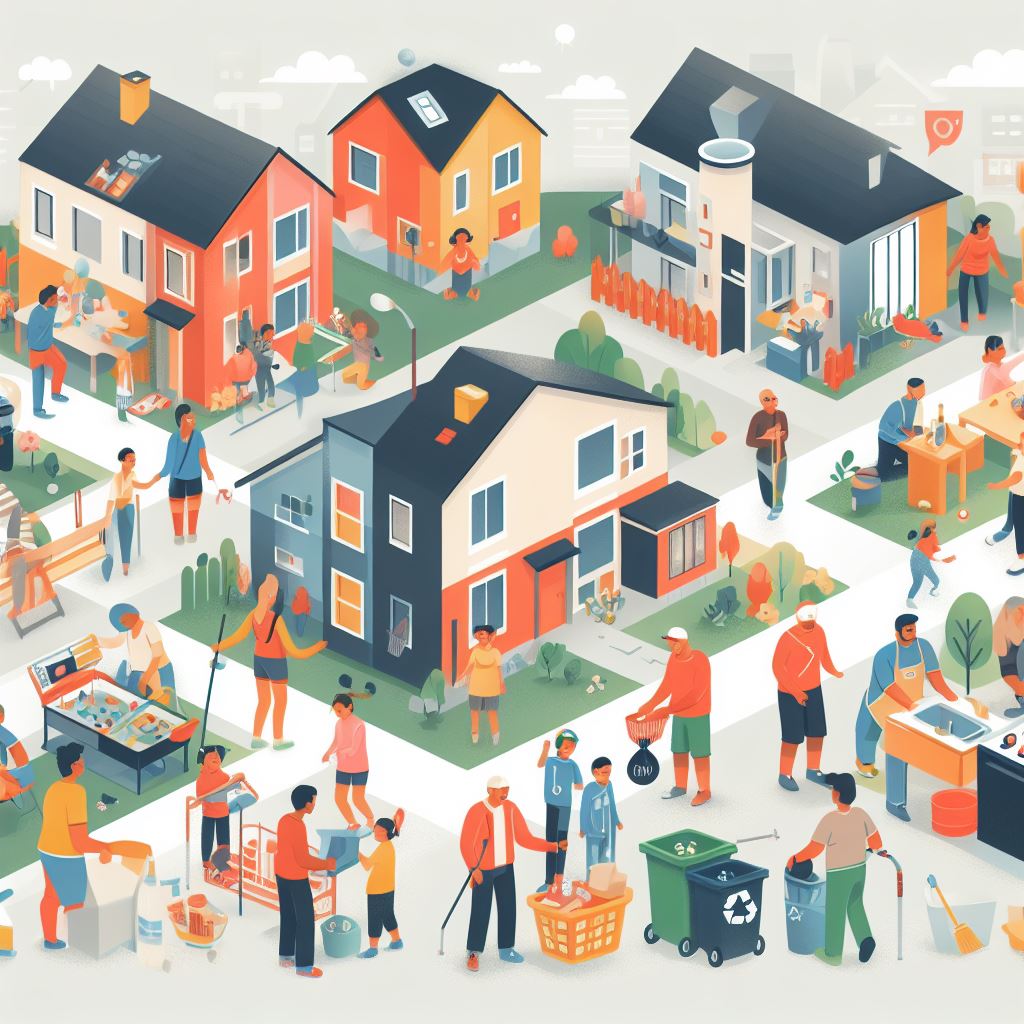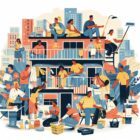Complying With Rules: a Tenant’s Guide to Subsidized Housing

Are you ready to navigate the world of subsidized housing? Look no further than this comprehensive guide, designed just for you.
From eligibility requirements to proper use and maintenance of property, we’ve got you covered.
Get ready to learn about income reporting, lease agreements, and respecting community guidelines.
With our detailed and informative tips, you’ll be well-prepared to comply with the rules and make the most of your subsidized housing experience.
Let’s dive in!
Key Takeaways
- Meeting the eligibility requirements does not guarantee immediate approval for subsidized housing due to high demand.
- Accurate reporting and verification of income, including all sources of income, is crucial for subsidized housing applications.
- Understanding and adhering to the terms and conditions outlined in the lease agreement is essential for tenants in subsidized housing.
- Respecting the property, maintaining a safe and hygienic living environment, and following community guidelines are important responsibilities for tenants in subsidized housing.
Eligibility Requirements
To qualify for subsidized housing, you must meet specific eligibility requirements. These requirements are put in place to ensure that the limited resources for subsidized housing are allocated to those who truly need them.
The first requirement is that your income must fall within a certain range. This range is determined by the federal government and varies depending on your family size and the area you live in.
Additionally, you must be a U.S. citizen or have eligible immigration status. Proof of this will be required during the application process.
Furthermore, you must also pass a criminal background check. Certain criminal convictions may make you ineligible for subsidized housing.
Finally, you must be able to provide references that can verify your character and reliability as a tenant. These references can be from previous landlords or employers.
It’s important to note that meeting these eligibility requirements doesn’t guarantee that you’ll be approved for subsidized housing. Demand for subsidized housing often exceeds the available units, so there may be a waiting list.
Income Reporting and Verification
When applying for subsidized housing, it’s important to accurately report and verify your income. This is because your eligibility for subsidized housing is based on your income level and any discrepancies in reporting could result in denial or termination of benefits. To ensure that your income is reported correctly, you’ll need to provide documentation such as pay stubs, tax returns, and bank statements to verify your income.
It’s crucial that you report all sources of income, including wages, social security benefits, pensions, and any other form of financial assistance. Failure to report any income can lead to serious consequences, such as eviction or even legal action.
Income verification is a process used by housing agencies to confirm the accuracy of the income reported by applicants. This is done by contacting employers, financial institutions, and other relevant sources to obtain official documentation of your income.
It’s important to note that providing false information or withholding information during the income verification process is considered fraud and can result in criminal charges.
To ensure a smooth income reporting and verification process, it’s recommended to keep accurate records of your income and any changes in your financial situation. If there are any discrepancies or changes in your income, it’s important to notify your housing agency immediately.
Lease Agreement and Rent Payment
Accurate and timely rent payment is essential for tenants in subsidized housing to uphold their lease agreement and ensure continued eligibility for benefits. When it comes to paying rent, it’s crucial to understand the terms and conditions outlined in your lease agreement. Typically, the lease agreement will specify the due date, payment method, and any late fees or penalties for missed payments. It’s important to familiarize yourself with these details to avoid any misunderstandings or potential issues.
To ensure that your rent payment is accurate, it’s recommended to double-check the amount due before making the payment. This can be done by referring to your lease agreement or contacting your landlord or property management office for clarification. Keeping a record of your rent payments is also advisable, as it can serve as proof of payment in case of any disputes or discrepancies in the future.
When it comes to timely payment, it’s crucial to adhere to the due date specified in your lease agreement. Late payments can’t only result in additional fees but may also jeopardize your eligibility for subsidized housing benefits. If you anticipate any difficulties in making your rent payment on time, it’s essential to communicate with your landlord or property management office as soon as possible. They may be able to provide you with alternative payment arrangements or offer guidance on available resources to help you meet your obligations.
Proper Use and Maintenance of Property
Maintaining the proper use and maintenance of the subsidized property is crucial for tenants in upholding their lease agreement and ensuring the continuation of their benefits. By following these guidelines, you can keep your subsidized property in good condition and avoid any potential issues:
- Report maintenance issues promptly: If you notice any repairs that need to be done, such as leaks or faulty appliances, notify your landlord or property manager immediately. Timely reporting allows for prompt repairs and prevents further damage.
- Keep the property clean and tidy: Regularly clean your unit, including floors, countertops, and bathrooms. Properly dispose of trash and avoid clutter to maintain a safe and hygienic living environment.
- Respect the property and its amenities: Treat the subsidized property as if it were your own. Be mindful of any rules regarding noise, pets, or smoking. Respect shared spaces and facilities, such as common areas and laundry rooms.
- Avoid making unauthorized alterations: Seek permission from your landlord before making any changes to the property, such as painting walls or installing fixtures. Unauthorized alterations can lead to penalties or even eviction.
Respecting Community Guidelines
To ensure a harmonious living environment, it’s essential for tenants in subsidized housing to adhere to community guidelines. These guidelines are put in place to promote a sense of community, respect, and consideration among all residents. By following these guidelines, you contribute to creating a positive and inclusive living environment for everyone.
One important aspect of respecting community guidelines is maintaining a noise-free environment. Be mindful of your neighbors and keep noise levels to a minimum, especially during nighttime hours. This includes refraining from loud music, excessive conversations, or any other activities that may disturb others.
Respecting common areas is another vital aspect of community guidelines. These areas, such as lobbies, hallways, and recreation rooms, should be kept clean, tidy, and free from any personal belongings. Make sure to dispose of trash properly and follow any rules regarding the use of shared spaces.
Additionally, it’s crucial to respect the privacy of your fellow tenants. Avoid entering their apartments without permission and refrain from sharing their personal information with others. Respecting boundaries and personal space contributes to a sense of trust and security within the community.
Frequently Asked Questions
Can I Have a Pet in Subsidized Housing?
Yes, you can have a pet in subsidized housing. However, there may be restrictions such as breed or size limits. Make sure to check with your housing provider to understand their specific pet policies.
How Do I Request Repairs or Maintenance in My Subsidized Housing Unit?
To request repairs or maintenance in your subsidized housing unit, you can submit a maintenance request form to the property management office. Be sure to provide specific details about the issue and any necessary documentation.
Are There Any Restrictions on Guests or Visitors in Subsidized Housing?
There may be restrictions on guests or visitors in subsidized housing. Check your lease agreement or contact your housing provider for specific guidelines. It’s important to comply with these rules to maintain your eligibility.
Can I Make Modifications to My Subsidized Housing Unit?
Yes, you can make modifications to your subsidized housing unit. However, it is important to follow the guidelines and obtain permission from the housing authority before making any changes to ensure compliance with regulations.
What Happens if My Income Changes After I Move Into Subsidized Housing?
If your income changes after moving into subsidized housing, it is important to report it to the housing authority. They will review your circumstances and determine if adjustments need to be made to your rent.



